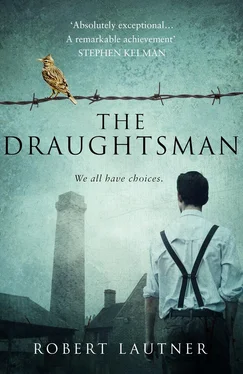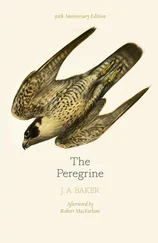1 ...6 7 8 10 11 12 ...19 The beer and wine flushed on me. A temper at defending my work. Now. Before my first pay.
‘Do you not want me to work? You were the one who wanted to go to my parents to celebrate. Now you want to deride my employers? Nothing happens in this world, Etta, unless someone sells something to someone else. Nothing.’ I walked on, left her behind me until her voice came.
‘I’m sorry, Ernst,’ she said. ‘Ernst?’ Like a charm. Holding me to the street.
I turned back to look at her framed in the sun. She walked out of it to me. Took my arm again.
‘I’m very proud of you. For you. Maybe it’s that you are going to the camp tomorrow. I’m worried. For you. I am being foolish.’
We walked on.
‘I promise you,’ I said, calm now, ‘I won’t do anything for you to worry.’
‘Here. Put this on.’
Monday morning. We were in Hans Klein’s black Opel on the main road outside Kleinmolsen, the groan of the wipers unable to cope with the sheets of rain but Klein did not slow his speed. I could feel the water on the road hitting the panelling like waves. The tyres almost skating along. He had taken his hand off the wheel to pass me a Party pin.
It was plain tin, not enamelled. I did not question and put it on my lapel. His was enamelled and, again, as we slid along the road, he put it on with one hand.
‘It does not hurt to wear it,’ he said. ‘Gives a good impression. I am personally not political. Yourself?’
‘No, sir. I have not given it much thought.’
‘Prüfer is of course. And the Topfs. But then they would have to be dealing with the SS. Are you a union man?’
My interview had contained this question. The usual standard. ‘Are you now or have you ever been a member of the communist party?’
Who would say, ‘yes’?
‘Are not unions banned?’
He nodded, managed to light a cigarette with one hand.
‘I’m sure that some of our workers are members of the KPD. Communists. And the SDP. There was a faction of them at the factory in the 30s. I think the Buchenwald workers are influencing ours. The camp is nothing but communists. I’m sure Sander is on top of it. But keep your own ear out and let me know if you hear anything. I will make you my top boy on the floor!’ He shifted a gear down at last. ‘I cannot trust the old ones.’
The countryside blurred past. Twenty minutes in the roaring car, a super-six, and Klein showed it off. Twenty minutes. A camp a short drive from Erfurt and Weimar. I had only been in taxis before and probably only half a dozen times in my life. I did not appreciate cars, or watches, shoes and suits, but I was beginning to think that Klein thought such things impressive.
‘It is a nice car, Herr Klein.’ I looked around as if it was the Sistine Chapel, trying to admire it as we rolled across the railway line, the rail that led to the camp.
‘Twenty-five hundred marks,’ he said for reply. I imagine that is how he judged the world. The price of things. He pivoted the car between a gap in the forest with just a gear change, no brakes, and I was braced against the door.
A good gravelled road, the beech forest cut back from it with maintained grass all along. Buchenwald. Beech Tree Forest. A name for holidays. As the camp came in sight, set in a clear plain, the rain slowed, I wiped the condensation from the window, sure that I had seen men outside, outside on the grass. They were cutting the grass, had stopped to watch the car. Mowing in the rain. Their garb unmistakeable.
‘There are prisoners out there?’ I looked at him. My professor now. ‘Outside the prison?’
Klein did not even check.
‘Of course. Why not?’
‘But might they not escape?’
‘Where would they go? What would they do? Escape to starve? To be shot? Not everyone is the Count of Monte Cristo, Ernst. Some men know they belong in prison. Some men know they do not like work. Career criminals. Why escape one prison for another? Why buy your own bed and food when we can buy it for them.’ He put his arm across me to point to an outcrop of rocks not far from the barbed fence. ‘They even have a zoo. Bears, monkeys, birds of prey. You could take kids here. Although the zoo is for the guards of course. The prisoners have a cinema and theatre. A brothel for the non-Jews.’
He closed the car down the gears as we approached the gated walls. All the roads leading off the main marked by decorative wooden signs, this one, the road to the main gate designated ‘Caracho Road’ – Caracho Spanish for ‘double-time’ – decorated with four swarthy-looking men hunched and hurrying close together in prison clothes. Some of the prisoners here would have been from the Spanish war. The building like a factory except for barbed wire instead of walls. A red-timbered building like a Swiss chalet sat atop the entrance, a balcony all around, a clock above, a flagpole rising out of it. The flag just a red swathe. Beaten by the rain. Taller than this I could see the square tower of the crematoria, to the right of the gate, almost opposite the odd zoo. Not far from the main building. Good. We would not have to go deep into the camp.
Klein reached to the back seat, passed me his briefcase as we waited for the guards to come.
‘You take the notes. I will measure and photograph. I have my own Leica. Better than Sander’s Zeiss he would have you use. One hundred it cost me.’
The latticed door in the gate opened. Words were written in the iron tops but I could not make them out. They were reversed. To be read from the other side only. A black-painted slogan on the stucco wall above the gate read to those who approached:
‘RIGHT OR WRONG THIS IS MY COUNTRY.’
A grey uniform and box-cap stepped through, his jacket instantly dappled with the rain.
Klein stubbed out his cigarette.
‘You have your identification, Ernst?’ His window opened. I passed the card and Klein gave the guard his grin with our papers.
‘Good to see you again, Simon. Pity about the rain, eh?’
Simon smiled back but became stern when he looked at our cards. This was his purpose. His moment. It would be his hand that waved the gate open.
‘We are here to meet the Senior-Colonel,’ Klein said without being asked. ‘About new ovens. Another breakdown, eh?’
‘All the time.’ Simon handed back our cards. ‘Build a better one for us.’
‘Pay us more money, eh?’ Klein winked.
A circus going on around me. A joviality incongruous to what was about to happen. I was outside a prison. About to go within. I had never handed a soldier my identification before. I could only see his holster from my view in the car, another guard watching from the gate with a rifle slung. To see them so close. The shape of a gun hidden by leather a few feet from my eyes. I was in a dream. Klein knew an SS soldier’s name and had asked him for more money. An anxious dream. A little nausea, from this scene or the chicory coffee of my breakfast. Not even an oat biscuit in the house to settle my stomach.
Klein’s window closed and the gates opened. The Opel into gear. As usual he noticed or sensed everything.
‘Don’t worry, Ernst. It is quite natural to be nervous around soldiers. And prisons. You will get used to it.’ He leaned over, grinned. ‘As long as you are not forced to get used to it, eh?’
We parked on the left. There were trucks beyond the gate, waiting for their work detail and then another strange sight to add to my dream.
There was a full band in the courtyard, an orchestra almost, dressed in red trousers and green vests. Tubas and horns, even a man with a great drum on his chest like a circus parade. We got out and Klein grinned at me over the roof of the car.
‘Ah. We are in time for the band. This is good, Ernst. Every morning and evening they sing the camp song.’
Читать дальше












